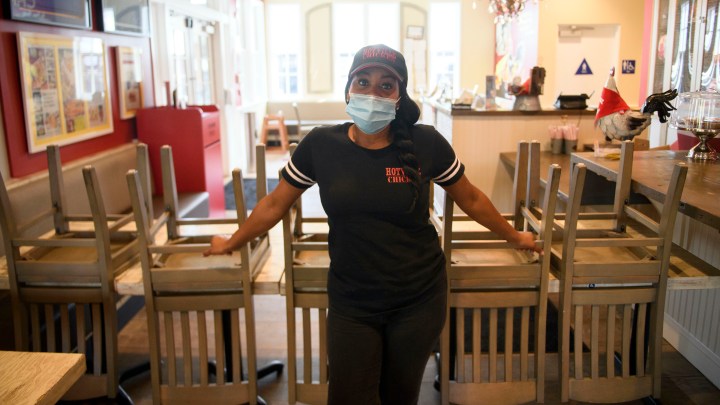
For restaurants, tough pandemic decisions are starting to pay off
For restaurants, tough pandemic decisions are starting to pay off

Small business owners have had to make a lot of tough decisions throughout the pandemic. Restaurant owners, for example, have had to cut staff, reduce hours, or, in a lot of cases, shut down.
For the restaurants that have survived, a lot of those changes made their businesses more efficient. And now that the economy’s been coming back, a lot of those tough decisions are starting to pay off.
At 21st Amendment Brewery in the San Francisco Bay Area, customers can sit down at a table, scan a QR code with their phones, and order beers and food immediately.
“They don’t have to wait to be approached by a server,” said co-founder Nico Freccia. “They don’t have to wait for somebody to come over and give them specials.”
Now, Freccia said, he’s planning on running his big, outdoor events the same way.
“You need less staff,” he explained. “People feel safer, because they’re not passing around money and touching things that other people are touching. They don’t have to wait in line instead of being able to drink beer.”
At the Baltimore sandwich restaurant Ekiben, co-owner Steve Chu made a smaller decision: to cut the phone line. The decision saves him some money, for one. On top of that, Chu said his staff was getting overloaded with questions like “What time is the restaurant open?” and “Does your bread have gluten in it?”
“It was like stuff that you could just go on Google and look,” Chu said. “That was taking up a lot of time, and really stressing out the team.”
At the Falls Church, Virginia, restaurant Thompson Italian, co-owner Gabe Thompson has been working to streamline the menu. He’s also been cutting down the number of steps required to prepare items, like the marinara sauce. Thompson said making the production process leaner has helped the restaurant be more nimble.
“It’s been nice being able to basically start over, in a way,” he said. Small changes like these add up. And they’ve been happening throughout the restaurant industry.
“Examples of this might be, say, a restaurant that now operates with one general manager, instead of a three-manager front of house,” said Matt Hetrick, who runs the accounting firm Harmony Group, which focuses on small business clients.
Hetrick said the pandemic forced restaurants to become more efficient. It also provided opportunities for them to receive government aid. “What they’re coming out of the pandemic with is stronger balance sheets and, realistically, more effective organizations,” Hetrick said.
That’s helped businesses like Thompson Italian to turn a profit during the pandemic. Co-owner Katherine Thompson said the restaurant’s been putting that money into building a deck. And working on a new patio space.
“I think if we didn’t have that cash cushion, we would be much more hesitant to spend the money to then bring in more business,” Thompson said. This year, Thompson said she’s thinking about expanding.
“We’re definitely looking for spaces,” she said. “We haven’t nailed anything yet.”
A lot of businesses have gotten leaner by shedding staff. When the pandemic started, Jennifer Vitagliano’s Michelin-starred Manhattan restaurant The Musket Room went from being a full-fledged fine dining experience with 38 employees to a two-person operation: Vitagliano and her chef.
“She was downstairs cooking, and I was upstairs, you know, making sure no one robbed the place, and interacting with customers,” Vitagliano said. Since then, Vitagliano said she’s slowly brought back most of her staff.
Some of the experiments she tried during the pandemic, such as selling pastries out of a vintage food truck, didn’t really make sense for the long haul. But others did. The kitchen’s sharing more ingredients with the bar. The restaurant’s using excess food, like coffee beans and citrus peels, to make house liqueurs.
“Little things born out of necessity,” Vitagliano said, “are just part of our day-to-day now.” If the restaurant keeps running as efficiently as it has in the last few months, she said, its revenue next year will be higher than in 2019.
There’s a lot happening in the world. Through it all, Marketplace is here for you.
You rely on Marketplace to break down the world’s events and tell you how it affects you in a fact-based, approachable way. We rely on your financial support to keep making that possible.
Your donation today powers the independent journalism that you rely on. For just $5/month, you can help sustain Marketplace so we can keep reporting on the things that matter to you.

















